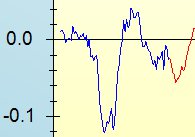
The fragility of the economy in the Eurozone remains a concern - regardless of conditions within the UK itself, there are still some significant downside risks.
Geraint Johnes weblog: comments on news stories of the day

The fragility of the economy in the Eurozone remains a concern - regardless of conditions within the UK itself, there are still some significant downside risks.
(1) 'The proportion of graduates who reach the new debt write-off point of 30 years increases to 56 per cent' - in other words most graduates will never repay the full amount of their loan. Indeed, 'the average female graduate will pay back just over half of what they borrow, compared with 87 per cent for the average male graduate'. This, of course, means that many (if not most) students are indifferent about the precise level of fees that they are charged, and this in turn incentivises many universities to charge at the cap of £9000. Another implication of this is that the taxpayer ends up having to bear the burden of the unpaid debt, so that the exchequer savings of the new scheme are not as great as might have been hoped. On the assumption that growth raises graduate earnings by 1.5% per year, the exchequer savings amount to £500m per year - which represents a relatively minor reduction in the public sector deficit.
(2) The paper does not produce revised estimates of the rate of return to higher education. It does point out that the average graudate 'will in futre make repayments totalling £25830 over their lifetime - an increase of 52%' compared with the system that existed before 2012. Meanwhile, 'the average student enjoys an increase in cash support during their degree of some 12 per cent, amounting to £19580 in total'. For some students at the margin, the rate of return to higher education has presumably fallen to such an extent that the investment is no longer worthwhile.
Chowdry, H., Dearden, L., Goodman, A., & Jin, W. (2012). The Distributional Impact of the 2012-13 Higher Education Funding Reforms in England* Fiscal Studies, 33 (2), 211-236 DOI: 10.1111/j.1475-5890.2012.00159.x
To bookmark this page in social bookmarking or social networking sites (delicious, facebook etc.) please click below: